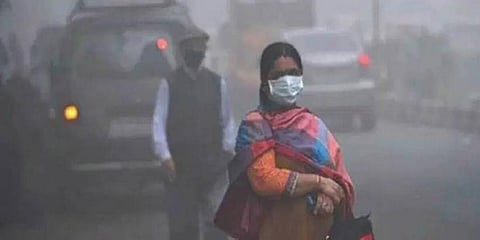

NEW DELHI: Nearly half of COVID positive cases covered in a survey went unreported in April as many people opted for home antigen testing, LocalCircles claimed.
The survey conducted by LocalCircles claimed that 42 per cent of Delhi-NCR residents that had symptoms and took a COVID test in the last 30 days only took the self rapid antigen test.
Only one in three respondents covered in the survey from Delhi-NCR took an RT-PCR test in the last 30 days, while the majority opted for at-home antigen testing pointing to a sizable undercounting of daily caseloads, the survey contended.
The survey received 16,000 responses from residents from across the districts of Delhi-NCR.
Over 62 per cent respondents were male while 38 per cent were female.
"Residents of Delhi and NCR cities of Gurugram, Noida, Ghaziabad, and Faridabad have been writing on LocalCircles how most people in their family, friends are just opting for the at-home antigen test and not even taking the RT-PCR test anymore," it said.
"Positives from these at-home tests are not reported anywhere and the government data do not count them in official case figures," the LocalCircles claimed.
The question in the survey asked, "In the last 1 month when you or family members had some symptoms and needed a COVID test (non travel), what type of test did you undertake?" In response, seven per cent said "RT-PCR several times, another seven per cent said RT-PCR once/twice".
Eleven per cent said "Rapid Antigen Test multiple times", and seven per cent said "Rapid Antigen Test once/twice".
Fifty-seven per cent of the respondents, or 9,608, said they did not take any test in last one month.
Data from the 7,248 individuals who confirmed taking the COVID test showed that 17 per cent of them took"RT-PCR several times", and 16 per cent took "RT-PCR once/twice".
Twenty-six per cent took "Rapid Antigen Test multiple times", and 16 per cent took "Rapid Antigen Test once/twice".
Around 16 per cent took "Mainly Rapid Antigen Test and RT-PCR test once/twice", while nine per cent couldn't say which test was taken by them.
"With the 42 per cent Delhi-NCR residents who took the at home rapid antigen test post symptoms not being in the official numbers, they are clearly understated by that much," LocalCircles claimed.
The spurt in Covid cases and test positivity rate in Delhi over the last few weeks does not suggest the onset of a new wave, but people should keep basic mitigation measures in place to prevent the spread of the infection, experts said on Tuesday.
Eminent epidemiologist Dr Chandrakant Lahariya said the test positivity rate is stagnant and it means the infection is spreading at the same rate and there is no wave.
There is a subtle change in the hospitalization rate which also proves that there is no wave, Lahariya said.
Absolute numbers have no meaning.
The number of cases will be more if you do more tests, he said.
"Therefore, we should not worry too much about the test positivity rate and the absolute number of cases, the main parameter is the hospitalization rate and the mortality rate," Dr Lahariya said.
He emphasised that there is no need of any mandated intervention and a calibrated approach must be adopted, it is advisable for people to wear masks in public indoor settings, people should get vaccinated and high-risk individuals should take more precautions.
"People should understand that the virus is still in circulation. They need to wear masks on their own and it should not be mandated by the government," he said.
Dr Rajeev Jayadevan, co-chairman of the Indian Medical Association's national task force on coronavirus, said the test positivity rate not going up suggests it is not like the inferno sparked by the Delta variant.
"It is too early for a large wave to happen, but we must keep basic mitigation measures in place without compromising economic activity," he said.
Keep a mask on when you enter any indoor space, there is no exception to that.
The infection is spreading, it is here and we must continue taking all primary precautionary measures, Dr Jayadevan said.
Dr Jugal Kishore, head, community medicine, Safdarjung Hospital, said the positivity rate is high in Delhi because authorities are conducting focused testing only those who have symptoms are undergoing tests.
So, there is a high chance for them to come out positive.
There are many more cases in the community but these are very mild, he said.
Because the absolute number of tests is less, the number of cases is also low.
So, there isn't a definitive curve which could project a way in the capital, he said.
The sub-variants of Omicron, which are behind the spurt in cases in the city, have a very short incubation period and the symptoms persist only for up to three days.
Therefore, going by the trend, cases should start coming down within a week, he added.
Since April 20, the number of Covid cases in Delhi has been oscillating between 1,000 and 1,600.
The test positivity rate has remained between four percent and seven percent since April 16.
However, the hospitalisation rate so far has been low, accounting for less than three percent of the total active cases, government data showed.
Currently, 178 COVID-19 patients are admitted in Delhi hospitals, while 4,490 are recuperating in home isolation, it said.
Of the 9,577 beds available for COVID-19 patients in various hospitals, only 191 (1.99 percent) are occupied, the data showed.
Delhi Health Minister Satyendar Jain had last week said COVID-19 cases have increased in the capital but the situation is not serious as people are not developing severe disease and hospitalisation rate is low.
He had attributed the low hospitalisation rate to vaccinations and naturally acquired immunity.